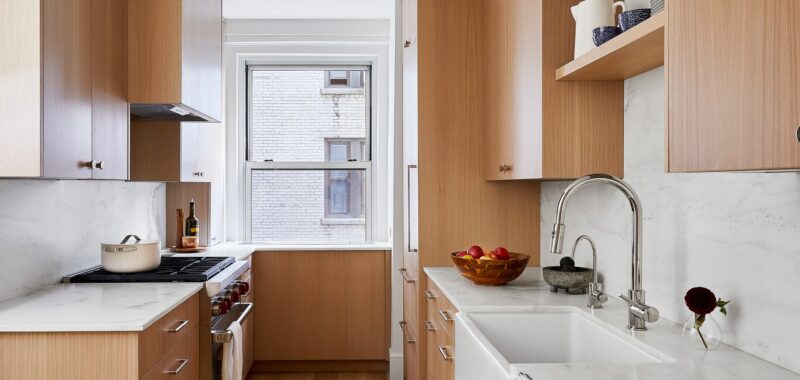Anyone who has ever strolled through an IKEA in search of home decor might feel confident taking on a Scandinavian kitchen remodel, but all that understated elegance and full functionality can be surprisingly hard to create. As with most spaces informed by the decor style, Scandinavian kitchen design is uncluttered almost to the point of minimalism, though it features myriad subtle points of interest.
The look is characterized by clean lines and contrasting natural materials. Occasional pops of color and natural elements are also common in the Scandinavian kitchen, as is a tangible sense of utility: Yes, these kitchens are beautiful, but when the meal and cleanup are done, everything has its place. A Scandinavian kitchen is nothing if not orderly. To give you a sense for how to balance it all out in that classic, subtly chic Nordic fashion, we reached out to interior design experts for their insights, design ideas, and advice on how to craft the ideal Scandinavian kitchen.
What design elements define the Scandinavian kitchen?
“In essence, the Scandinavian kitchen is about simplicity in mood, form, and design,” says Olma Fuentes, the founder and principal designer of Deni + Dove Interiors. “The color palette is typically neutral: beige, varying shades of white, and perhaps a touch of black. The overall aesthetic is pared back and restrained so that the environment feels serene and the focus is on the simple but high-quality craftsmanship. The design should look and feel modern, but it should also incorporate elements from nature, such as stone countertops or cabinetry in light-colored wood tones.”
Havard Cooper, founder and principal designer of Havard Cooper Architect, echoes Fuentes’s sentiment that the aesthetic hinges on that airy, sleek atmosphere. “The goal is to create a space that feels uncluttered, breathable, and inviting,” says Cooper, who has worked on multiple projects in Stockholm. “Natural light is critical in Scandinavian kitchens,” he adds. “Large windows are a must and are often left uncovered to maximize light. This is particularly important given the long, dark winters in Scandinavian countries.”
Why is the Scandinavian aesthetic well-suited to kitchens?
“The emphasis on natural light ties into the broader Scandinavian design philosophy of creating environments that enhance well-being and simplify daily life,” Cooper says. “This philosophy extends to kitchen maintenance too; surfaces are often chosen for their ease of cleaning as well as their aesthetic appeal.”
Form follows function in these largely streamlined spaces, which makes the Scandinavian style ideal for a kitchen, where organization is crucial. If you’ve done your setup in correct Scandi fashion, all your kitchen tools, plates, pots, and pans will have their place, often out-of-sight instead of on display to preserve that clutter-free look. “These kitchens follow a function-first approach with minimal aesthetics while supporting their function through well thought-out storage pieces,” says interior designer Dawn Bane of the Spectrum Design Group.

